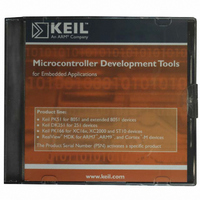MDK-ARM Keil, MDK-ARM Datasheet - Page 123

MDK-ARM
Manufacturer Part Number
MDK-ARM
Description
KIT REALVIEW MCU DEVELOPMENT
Manufacturer
Keil
Type
Compiler and IDEr
Specifications of MDK-ARM
For Use With/related Products
ARM MCUs
Lead Free Status / RoHS Status
Lead free / RoHS Compliant
- Current page: 123 of 156
- Download datasheet (3Mb)
Getting Started: Building Applications with RL-ARM
The RL-USB stack is made up of the following files:
usbcfg.h - is a templated configuration file that allows you to enable class
support for the Human Interface, Mass Storage, and Audio classes. Is is also
used to set the USB configuration and to enable interrupt handlers for the
following events:
usbuser.c - this module contains event handlers for Endpoints 1 – 15. These
interrupt handlers allow you to read and write data to the individual endpoint
buffers.
usbdesc.c - this module contains the USB descriptors sent to the host during
enumeration. These are arrays of data that must mirror the configuration of
the RL-USB driver firmware. If you make a mistake here, nothing will
work!
usb.h - this file provides an extensive set of #defines for use in the
file. This allows you to construct the descriptors in “natural language” rather
than arrays of numbers. This is a huge help in constructing correct
descriptors.
usbhw.c - this file provides the necessary low level code for a given USB
controller. Normally, you will not need to edit this file.
usbcore.c - this file contains the bulk of the generic RL-USB code.
Normally, you will not need to edit this file.
usbhid.c - this is the support file for the HID class. By default, the HID class
is configured to transfer one byte IN and OUT packets to the host. The HID
class will support a maximum packet size of 64 bytes.
usbmsc.c - this is the support file for the mass storage class. The RL-USB
MSC driver links directly to the RL-FlashFS, so normally, you will not need
to edit this file.
usbadc.c - this is the support file for the Audio class support. This class
transfers data by isochronous packets and you will need to add the necessary
code to transfer this data to and from your audio peripherals.
• Device events: such as start of frame, USB bus reset, USB wakeup.
• Endpoint events: Interrupts raised when an IN or OUT packet is
transferred from a given interrupt.
• USB core events: These respond to commands such as set interface sent on
the control pipe (Endpoint 0).
usbdesc.c
123
Related parts for MDK-ARM
Image
Part Number
Description
Manufacturer
Datasheet
Request
R

Part Number:
Description:
KIT REALVIEW MCU DEVELOPMENT
Manufacturer:
Keil
Datasheet:

Part Number:
Description:
Development Software SUPPORT EXTENSION FOR MDK-ARM-B
Manufacturer:
Keil Software

Part Number:
Description:
Development Software SUPPORT EXTENSION FOR MDK-ARM
Manufacturer:
Keil Software

Part Number:
Description:
KIT REALVIEW MCU DEVELOPMENT
Manufacturer:
Keil
Datasheet:

Part Number:
Description:
Development Software MCU DEV KIT FOR ARM UPG TO FLOATING LIC
Manufacturer:
Keil Tools

Part Number:
Description:
Development Software MCU DEV KIT FOR ARM W/ FLOATING LICENSE
Manufacturer:
Keil Software

Part Number:
Description:
Development Software MCU DEV KIT FOR ARM uVISION & C++ & RTX
Manufacturer:
Keil Tools

Part Number:
Description:
Development Software SUPP LICENSE RENEWAL 90+ DAYS NO TECH SUP
Manufacturer:
Keil Software
Part Number:
Description:
KEIL C-COMPILER INTERNATIONAL
Manufacturer:
Silicon Laboratories Inc

Part Number:
Description:
BOARD EVAL FOR LPC213X ARM MCU
Manufacturer:
NXP Semiconductors
Datasheet:
Part Number:
Description:
K60N512 Keil Tower Kit
Manufacturer:
Freescale Semiconductor
Datasheet:










